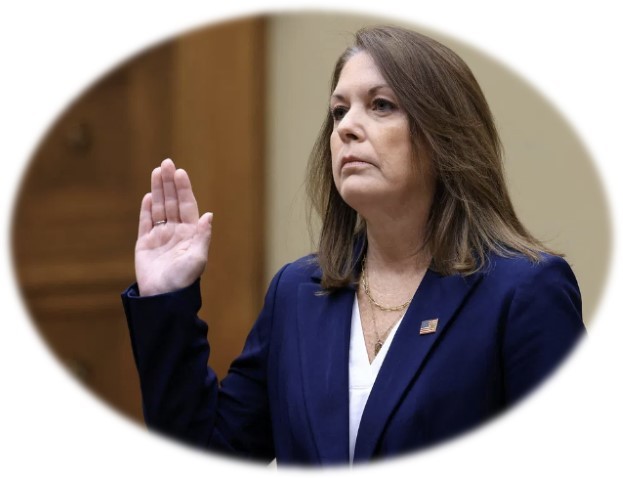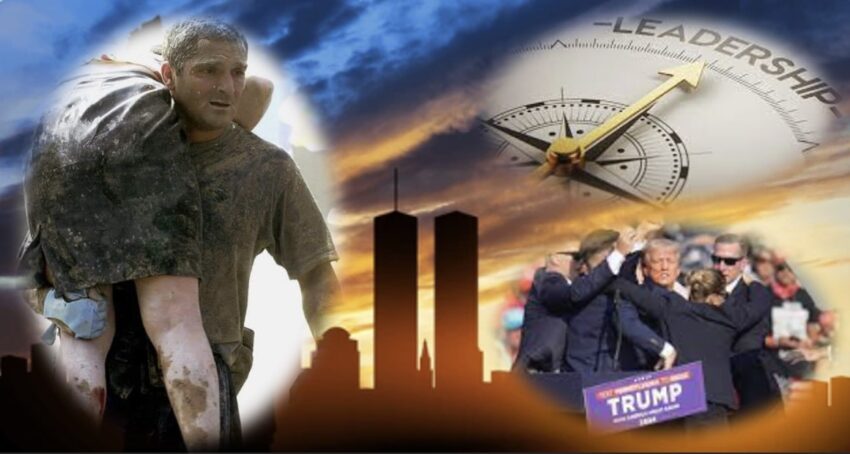Part 1: Lessons from History and the Next 0911
45,321 Article Engagements
“The most insidious threat we face today is not from external enemies; it is from within.“ – Matthew D. Ferrante, Former US Secret Service Agent
Introduction
It’s often said that history repeats itself. Looking back on ancient Rome, one of the world’s most powerful and prosperous empires, we see that complacency played a pivotal role in its downfall. Factors such as political instability, economic decline, reliance on external forces for protection, and a lack of civic responsibility led to Rome’s eventual collapse. These historical parallels can be seen today across both government and private sectors, where complacency poses an existential threat.
On this anniversary of September 11, 2001, we are reminded of the high cost of complacency and the dangers of ignoring evolving threats. As a 9/11 survivor, first responder, former U.S. Secret Service agent, and private sector executive, I have witnessed firsthand the consequences of complacency—rooted in a lack of leadership, accountability, transparency, responsibility, inaction, and the failure to learn from history and adapt.
Complacency is a feeling of self-satisfaction or contentment, often combined with a lack of awareness or concern about potential dangers or risks. It typically occurs when individuals or organizations become comfortable with the status quo and fail to recognize evolving threats or challenges. Complacency can lead to inaction, neglect of important tasks, or failure to respond effectively to new risks, which can ultimately result in negative consequences, especially in high-stakes environments like security, healthcare, or business.
This article is part of a multipart series that will explore how complacency has taken root in various sectors, why it is so dangerous, and what we can learn to prevent history from repeating itself.
Complacency in Security: The Case of the US Secret Service
The motto of the United States Secret Service, “Worthy of Trust and Confidence,” is more than just a slogan—it is indeed a call to action. Secret Service agents are tasked with protecting national leaders and critical infrastructure with integrity, bravery, self-sacrifice, and constant vigilance. Consider, you are more likely to get into Harvard, then to become a US Secret Service Agent.
“It is drilled into every USSS Agent’s head: Complacency Kills.“
Yet, even within this revered institution, the threat of complacency is ever-present.
Just prior to the assassination attempt on President Donald Trump, I had a conversation with a former colleague from the New York Field Office (NYFO). Her words still resonated with me: “It’s a different agency now.” I had already voiced my concerns about complacency within the Secret Service, particularly regarding former President Trump’s security. Given the divisive political climate and the increasing sophistication of threats, it was never a question of “if” an attempt would happen, but “when.” Despite the agency’s strong reputation, gaps in preparedness and leadership failures contributed to the inevitable.
The outcome was unacceptable, though not surprising. Complacency—whether through lowered standards, a lack of accountability, or the neglect of security protocols—creates dangerous vulnerabilities. In today’s rapidly evolving threat landscape, we cannot afford to let our guard down.
The Decline of Vigilance: A Lesson from 9/11
September 11, 2001, serves as a chilling reminder of what happens when complacency takes hold. In the months and years leading up to the attacks, multiple signals were missed, and warnings were ignored. Intelligence agencies had information about potential attacks, but bureaucracy, miscommunication, and an overreliance on outdated protocols led to the deadliest attack on American soil in modern history.
For many of us who were there that day, the emotional toll is something we carry every year. But what haunts us even more is the knowledge that much of the tragedy could have been prevented had we not become complacent in our national security.
The parallels to today’s challenges are striking. Cybersecurity, for instance, is a domain where complacency is rampant. Companies and governments alike fail to take the threat seriously until it’s too late. Much like the pre-9/11 era, there are warnings, yet not enough action is being taken to prevent the next big attack.
Situational Awareness: A Critical Tool in Fighting Complacency
One of the key principles in any security operation or in business alike is situational awareness. Whether at the national level, within an organization, or in our personal lives, understanding the environment around us is essential to mitigating threats and critical impacts.
On September 11, situational awareness could have saved lives. The same applies to the recent assassination attempt on former President Trump. Situational awareness is not just about reacting to immediate threats; it is about anticipating them. In a world where risks and threats are constantly evolving, complacency is a death sentence.
Falling on the Sword: Accountability and Leadership
Complacency doesn’t occur in isolation—it is enabled by leadership. Leaders set the direction and tone for the organization, leading by example and holding themselves accountable first and foremost. When leaders fail to hold their teams accountable, they create an environment where complacency can thrive and spread like a silent virus. Within the Secret Service, I’ve witnessed how political and administrative pressures started contributing to the ‘acceptable’ lowering of standards. Likewise, I have worked under some of the most exceptional competent leaders in both the US Secret Service and the private sector. This included highly competent women in leadership roles. It is important to note that competence or incompetence shows no discrimination. None of these competent women were given their positions – they earned it, just like the other competent leaders, i.e. through blood, sweat, self-sacrifice, and tears. True leadership ensures that organizations and teams are set up for success—not for failure, appearances, or self-serving interests. Results matter.
USSS Director Kimberly Cheatle resigned following the assassination attempt—was that the only step? Is she solely responsible, or was she simply a convenient scapegoat? The idea of a single point of failure is not likely. Accountability within the agency must extend beyond one individual. Critical failures often result from a cascade of events involving multiple accountable individuals (internally and externally). One must ask: Who appoints the Director of the United States Secret Service? How are executives and ‘leadership’ selected, and under what directives and organizational objectives? Like any other executive, the Director answers to a higher authority, this includes but is not limited to the Secret Service.

The Service is exactly that, i.e., to Serve, not self-service. Moreover, it is a great honor and privilege to serve the American people. It is a fact that the US Secret Service not only takes physical bullets for protectees; they take virtual bullets as well. It is true that the agency has a long history of ‘falling on the sword’ for others—perhaps it’s time to reconsider this practice to better serve its mission and its true clients: the American people. Indeed it is quite interesting listening to the hearings on the Trump assassination attempt and other hearings on critical failures, the line of questions, and concerns among the various politicians, especially by those who do not truly understand service and sacrifice.
“A politician is someone who will lay down your life for his country.” – Winston Churchill

Denigration and Stolen Valor
Denigration refers to the act of unfairly criticizing or belittling someone or something in a way that damages their reputation or lowers their perceived value. It involves making disparaging or derogatory remarks intended to undermine respect or confidence in the person or entity being targeted. Denigration often seeks to diminish someone’s accomplishments, worth, or character through unjust or malicious commentary.
As a society, we have ignored, marginalized, and/or denigrated those who serve selflessly, from military, to law enforcement, to our first responders. These are individuals who risk their lives to protect others, but they are often demonized, directly or indirectly, for doing their jobs. When leadership fails to support them or holds them to unrealistic standards, the result is a dangerous form of stolen valor—where the courage and sacrifices of these heroes are undermined.
The morale of any group directly impacts its overall effectiveness, as high morale fosters teamwork, motivation, and resilience, allowing members to perform better under pressure. Conversely, low morale can lead to disengagement, poor communication, and decreased productivity, hindering the group’s ability to achieve its goals.
Honoring Our Allies: We Must Never Forget
“Friendship is like the light of phosphorous, seen plainest when all around is dark.” – Charles Caleb Colton
We cherish and salute you, our allies, who stand with us in the fight against evil, especially during our darkest hours. In honor of 9/11 and in recognition of our allies, I recently expressed my deepest gratitude to a great friend and ally in England, who has honorably served his country in both government and the private sector. He has consistently supported the United States, and I had the privilege of working alongside him and other great leaders to mitigate substantial risks to our shared critical infrastructure. It is often those working in the ‘trenches,’ behind the scenes, who never receive the recognition or limelight they deserve, to whom we owe our deepest gratitude. I thanked him on behalf of both our nations and shared one of my favorite speeches, which continues to provide me with strength and inspiration to persevere, even in the face of overwhelming odds and evil.
The Evolving Threat Landscape
The threat landscape we face today is more complex than ever before. Nation-states, terrorist organizations, lone actors, and cybercriminals all pose significant risks to national security. These actors leverage technology such as drones, cyber tools, and advanced weaponry to launch attacks that are increasingly difficult to predict.
Complacency, combined with a lack of accountability and transparency, leaves us vulnerable. Whether in the government or private sector, we must stay vigilant and adaptable, recognizing that the threats we face are constantly evolving.
Are You Worthy of Trust and Confidence?
The questions we must ask ourselves today are these: Are we prepared? Are we vigilant? Are we worthy of trust and confidence? One must take individual responsibility and accountability to do their own part. That’s called leadership. Merely because you are given a title doesn’t make you a leader. Leaders lead the way, they take the tough assignments, not just the easy ones. Moreover, they hold themselves accountable first and foremost. If you specialize in holding others accountable; but not yourself first and foremost, then, you are not a leader.
As we reflect on the lessons of 9/11 and the dangers of complacency, it’s clear that history has a way of repeating itself if we do not learn from our mistakes. This series will continue to delve into the causes and effects of complacency, focusing on leadership, accountability, the constantly evolving threat landscape, and the importance of maintaining the highest standards in delivering excellence, regardless of your profession.
“Success has many fathers, but failure is an orphan.” U.S. President John F. Kennedy
To those who serve selflessly, we honor your courage and sacrifice. To the rest of us, the challenge is clear: we must remain vigilant, hold ourselves and our leadership accountable, or we will suffer the consequences of complacency once again.
We must each be willing to face uncomfortable truths, push beyond our comfort zones, and act with integrity, even when no one is watching. The question isn’t just whether our leaders are worthy of trust and confidence, but whether we are worthy of it ourselves.
Unlocking Genius and Prosperity: The Power of Exceptional Leadership for Outstanding Results
Stay tuned for the next installment of this series, where we will explore more examples of how complacency is killing progress and what we can do to fight back.




